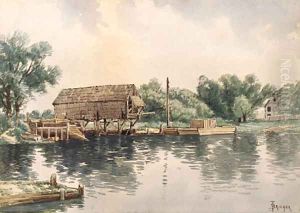Alfred Thompson Britcher Paintings
Alfred Thompson Britcher was an American artist known for his marine and landscape paintings. Born on January 10, 1837, in Southhampton, New York, Britcher grew up in a period when the United States was experiencing significant changes, including westward expansion and the Civil War. Despite the tumultuous times, Britcher managed to establish himself as a notable artist in the 19th century.
Britcher began his career as a portrait painter but eventually found his passion in landscape and seascape painting. He was particularly influenced by the Hudson River School, a mid-19th century American art movement embodied by a group of landscape painters whose aesthetic vision was influenced by romanticism. These artists, including Thomas Cole and Frederic Edwin Church, emphasized the natural beauty of the American landscape, which played a significant role in shaping Britcher's own style and subject matter.
Throughout his career, Britcher traveled extensively along the northeastern coast of the United States, from New York to Maine, capturing the stunning vistas of the Atlantic Ocean and the serene beauty of the coastal landscape. His works often featured calm seas, sailing vessels, and coastal scenes that conveyed a sense of tranquility and the sublime. Britcher's attention to detail, use of light, and ability to render water with realism contributed to his reputation as a skilled marine artist.
Britcher exhibited his work at several prestigious institutions, including the National Academy of Design and the Brooklyn Art Association. Despite his success, he did not achieve the same level of fame as some of his contemporaries. Nevertheless, his paintings are considered important contributions to American maritime and landscape art and are held in private collections and museums.
Alfred Thompson Britcher passed away on February 2, 1908. His legacy lives on through his art, which continues to be appreciated by art historians and collectors for its portrayal of the American Northeast's coastal grandeur during the late 19th century.
